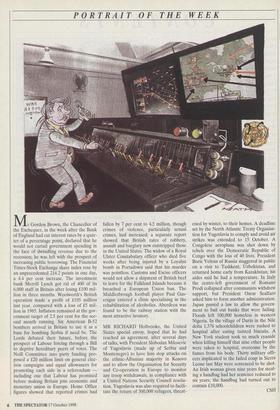PORTRAIT OF THE WEEK
Mr Gordon Brown, the Chancellor of the Exchequer, in the week after the Bank of England had cut interest rates by a quar- ter of a percentage point, declared that he would not curtail government spending in the face of dwindling revenue due to the recession; he was left with the prospect of increasing public borrowing. The Financial Times-Stock Exchange share index rose by an unprecedented 214.2 points in one day, a 4.4 per cent increase. The investment bank Merrill Lynch got rid of 400 of its 6,000 staff in Britain after losing £100 mil- lion in three months. Woolworth's British operation made a profit of £105 million last year, compared with a loss of £5 mil- lion in 1985. Inflation remained at the gov- ernment target of 2.5 per cent for the sec- ond month running. Six American B-52 bombers arrived in Britain to use it as a base for bombing Serbia if need be. The Lords debated their future, before the prospect of Labour forcing through a Bill to deprive hereditary peers of votes. The Neill Committee into party funding pro- posed a £20 million limit on general elec- tion campaigns and equal allowances for promoting each side in a referendum including one that Labour has promised before making Britain join economic and monetary union in Europe. Home Office figures showed that reported crimes had fallen by 7 per cent to 4.5 million, though crimes of violence, particularly sexual crimes, had increased; a separate report showed that British rates of robbery, assault and burglary now outstripped those in the United States. The widow of a Royal Ulster Constabulary officer who died five weeks after being injured by a Loyalist bomb in Portadown said that his murder was pointless. Customs and Excise officers would not allow a shipment of British beef to leave for the Falkland Islands because it breached a European Union ban. The Middlesbrough football player Paul Gas- coigne entered a clinic specialising in the rehabilitation of alcoholics. Aberdeen was found to be the railway station with the most attractive lavatory.
MR RICHARD Holbrooke, the United States special envoy, hoped that he had reached an agreement, after several days of talks, with President Slobodan Milosevic of Yugoslavia (made up of Serbia and Montenegro) to have him stop attacks on the ethnic-Albanian majority in Kosovo and to allow the Organisation for Security and Co-operation in Europe to monitor any troop withdrawals, in compliance with a United Nations Security Council resolu- tion. Yugoslavia was also required to facili- tate the return of 300,000 refugees, threat- ened by winter, to their homes. A deadline set by the North Atlantic Treaty Organisa- tion for Yugoslavia to comply and avoid air strikes was extended to 15 October. A Congolese aeroplane was shot down by rebels over the Democratic Republic of Congo with the loss of 40 lives. President Boris Yeltsin of Russia staggered in public on a visit to Tashkent, Uzbekistan, and returned home early from Kazakhstan; his aides said he had a temperature. In Italy the centre-left government of Romano Prodi collapsed after communists withdrew support, but President Oscar Scalfaro asked him to form another administration. Japan passed a law to allow the govern- ment to bail out banks that were failing. Floods left 100,000 homeless in western Nigeria. In the village of Darin in the Nile delta 1,376 schoolchildren were rushed to hospital after eating tainted biscuits. A New York student took so much cyanide when killing himself that nine other people were taken to hospital, overcome by the fumes from his body. Thirty military offi- cers implicated in the failed coup in Sierra Leone last May were sentenced to be shot. An Irish woman given nine years for steal- ing a handbag had her sentence reduced to six years; the handbag had turned out to contain £10,000.
CSH










































































 Previous page
Previous page